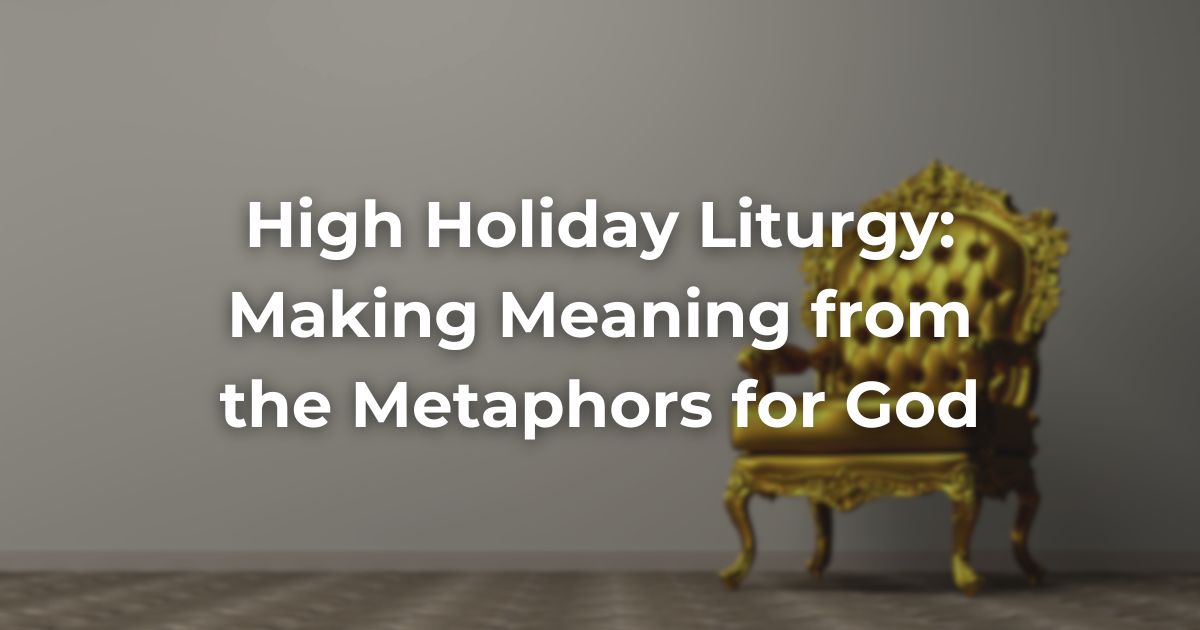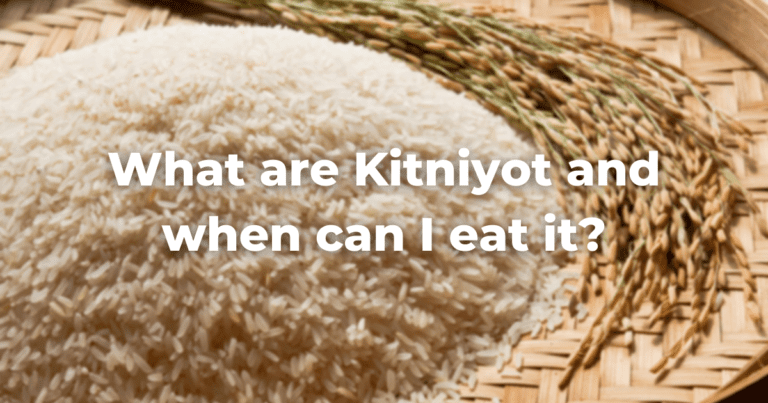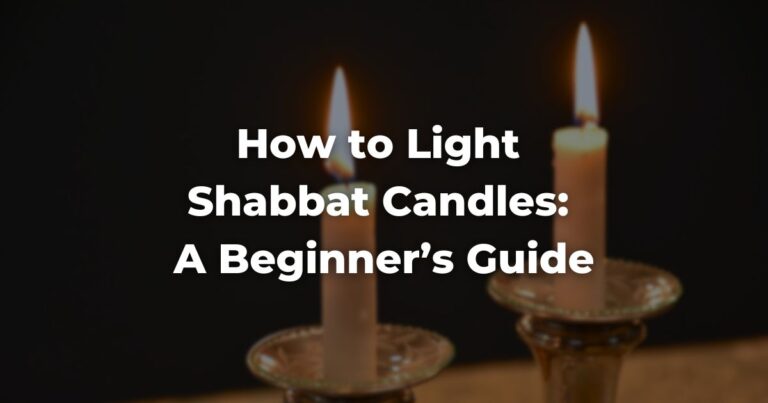This piece is part of Exploring Judaism’s 5785 High Holiday Reader. Download the whole reader here.
The traditional liturgy of the High Holidays does not always feel easy to connect to or relevant. The language may not resonate with our understanding of how the world works, and approaching the God-heavy text can be daunting if we’re not even sure we believe in God.
Even for those who do consider themselves to be believers, the idea of a male deity who sits on a throne determining our fate for the next year may not accord with our views of The Divine.
I believe that, ultimately, this liturgy does have meaning and relevance for every one of us. However, like trying to acquire any skill, becoming someone who is moved by prayer requires practice and dedicated learning. Particularly for those of us for whom connection to the text of tefillah does not come naturally, it is beneficial to study this liturgy in the way we would analyze a poem in an English literature class. In this article, I will speak generally about the function of metaphor in Jewish liturgy, and then will walk through the three main metaphors for God that we encounter during the High Holidays.
We live in a decidedly intellectual age. We can prove or disprove any statement with the click of a mouse, and we walk around with the collection of all human knowledge in our pockets.
This hyper-factual reality interferes with our ability to engage with religious ritual and texts. I often hear people (of all religious backgrounds) express that religion is no longer needed today, because we have the scientific research needed to explain how the world works. I think this view sells short the function of religion, being part of a religious community, and having a relationship with God.
While being concerned with facts and accuracy is a good thing, it has led us to read everything literally, including liturgy, which is full of metaphors and figurative speech.
In her book God is Here: Reimagining the Divine, Rabbi Toba Spitzer describes what author James Geary calls the ‘extinct metaphor’; that is, phraseology that has been around so long that we have forgotten that it was not originally intended to be literal. Spitzer argues that most (if not all) language we use to describe God fits into this category, and by forgetting its metaphoric origins, we have shut ourselves out of being able to use liturgy. This is especially the case if our beliefs (or lack thereof) in God do not align with a literal reading of the text.
It’s not only contemporary rabbis like Spitzer who recognize the metaphorical nature of much of our liturgy; of particular concern to the Rambam was promoting the idea that Hashem (God) does not actually have a body, worrying that not properly understanding this concept could lead to idol worship. Here is just one example of his grappling with textual language:
הַכּל לְפִי דַּעְתָּן שֶׁל בְּנֵי אָדָם הוּא שֶׁאֵינָן מַכִּירִין אֶלָּא (הַנּוֹפוֹת) [הַגּוּפוֹת] וְדִבְּרָה תּוֹרָה כִּלְשׁוֹן בְּנֵי אָדָם. וְהַכֹּל כִּנּוּיִים הֵן. שֶׁנֶּאֱמַר (דברים לב מא) “אִם שַׁנּוֹתִי בְּרַק חַרְבִּי”. וְכִי חֶרֶב יֵשׁ לוֹ וּבְחֶרֶב הוּא הוֹרֵג אֶלָּא מָשָׁל וְהַכֹּל מָשָׁל. (משנה תורה, הלכות יסודי התורה, א:ט)
All these [expressions were used] to relate to human thought processes which know only corporeal imagery, for the TorahRefers to the first five books of the Hebrew Bible, the Tanakh, also called the Five Books of Moses, Pentateuch or the Hebrew equivalent, Humash. This is also called the Written Torah. The term may also refer to teachings that expound on Jewish tradition. Read more speaks in the language of man. They are only descriptive terms, as [apparent from Deuteronomy 32:41]: “I will whet My lightning sword.” Does He have a sword? Does He need a sword to kill? Rather, this is metaphoric imagery. [Similarly,] all [such expressions] are metaphoric imagery. (Mishneh Torah, Foundations of the Torah, 1:9)
Essentially, the concept of God is far too big, complex, and metaphysical for our human minds to comprehend accurately, so we have always had to create analogies and figurative language to try to make sense of this Source. We speak about God in the language of the human body and experience, not because this is God’s nature but rather because our humanity is the lens through which we understand the world around us.
Now, even with this knowledge, it can still be a struggle to grapple with the highly gendered and hierarchical depictions of God during the Chagim (holy days). I think it behooves us to explore in more depth the following three metaphors for God during the coming holidays:
God as King
One of the sections of the Musaf (additional) service on Rosh Hashanah is known as Malkhuyot—establishing the kingship or sovereignty of Hashem. Colloquially, people often refer to this as the ‘coronation’ of God.
This is tied into the fact that Rosh Hashanah marks the anniversary of the world, quite literally היום הרת עולם in Hebrew––the day the universe was born. The beliefs that God created the world and rules over it go hand in hand and serve as the underpinnings to much of the High Holiday liturgy. The MidrashThis word is used in two ways, as both a concept and a literature. As a concept, midrash is the expansive interpretation of biblical texts. The term is used to describe the practice of rabbinic interpretation. As a text, it refers to specific collections of interpretations, particularly from the third to ninth centuries in the Land of Israel and Babylonia. Plural: Midrashim
Read more (Pesikta d’Rav Kahana 23:1) teaches that the world was created on the 25th of Elul, one week before Rosh Hashanah – the 1st of Tishrei, meaning that Rosh Hashanah is specifically the anniversary of the creation of the first human being.
As humans, we desperately want to have control (or at least the illusion of it) over our lives and the world around us. The reality is that our power is far more limited than we want it to be. We affirm this in the prayers of U’netaneh Tokef and B’Rosh Hashanah Yikateivun, admitting that we do not have total control over who will live and die in the coming year.
There are many other moments of extreme vulnerability during the chagim (the only days upon which we bow and fully prostrate to the floor), which allow us to fully contact the sobering reality that we are extremely small in comparison to the entire universe and all its forces.
While God-as-ruler may seem to suggest an extreme hierarchy between us and God, the fact that we have the opportunity to take action and bestow kingship upon God actually lessens the austerity of this concept. In a democracy, a ruler should be chosen by the people, rather than force themselves into leadership via dictatorial rule.
Each year, we are given the opportunity to use our voice (through the liturgy) to establish our desire for God to be a ruling force in our lives. We get to express our recognition of our own smallness and our desire to be guided by a force larger than ourselves. It’s also notable that we get the chance to do this every year—human royal rulers are crowned only once in their lives and remain in power until they die or abdicate. With God, however, the contract must be renewed yearly. This shows that God also needs us–God’s power over us is conditional on our acceptance of being ruled, which can only come after we grapple with our inherent powerlessness.
God as Father
In the same line of the Avinu Malkeinu prayer, we encounter God as our father and describe Him as king. When we express our misdeeds before God, we do so in the context of relationality, repeating these ways that we connect to God before each sin is confessed. We state that we haven’t committed these transactions alone or in a vacuum, but specifically in front of the God whom we consider our parent and ruler.
There are ways in which a parent acts as a ruler to their children. They set the rules, and they determine the consequences for breaking them. However, a parent is (at least in a healthy family) expected to forgive their child. The parent watches their child develop from a helpless baby into an independent adult and understands that the child spends a long time learning to be a human and needs compassion for the messiness that this process often entails. This is very different from a king, who does not have a personal relationship with his subjects and is liable to make decisions without considering the needs and specifics of each individual person.
Unlike a Divine parent, human parents fall short, sometimes in minor ways and sometimes in traumatic and life-shattering ways. This can make relating to God as a parent challenging for those who do not have happy familial relationships, but it can also provide the opportunity to experience parental love in a way that may have been previously denied to them.
One question remains: Why is God specifically a male parent in this liturgy, as opposed to a mother?
While some may choose to read this metaphor as gender-neutral in their own tefillah, there is value in examining what we learn about God by specifically thinking of God as a father. From the perspective of human history and culture, fatherhood, especially active fatherhood, is much easier to opt out of than motherhood. Or, as Laura Dern’s character put it in her Marriage Story monologue, “the idea of a good father was only invented like 30 years ago.”
The GemaraThe discussion portions of the Talmud based on the quoted Mishnah. Read more is full of stories of rabbis who lived away from their wives and families for years or decades, returning only to produce more children. While other texts imagine Hashem as a mother, on these holy days, the rabbis are specifically calling on a version of divine parenthood that requires active choice and voluntary care for the child. As my friend and chevruta Roni Sosis writes, “God as a Father has a choice about whether to be close or distant to B’nei Yisrael, and we are asking God to choose closeness.”
Relating to God as a parent softens the blow of the Divine judgment we face during the chagim, and allows us to face this accounting in the context of unconditional love and mercy.
God as Judge
In my experience, the metaphor that people struggle with the most in this season is the idea of God judging our conduct and writing our names down in one of two books, determining whether or not we will survive the coming year (it also tends to lead to comparisons to Santa Claus).
Even if you do not literally believe in the above, what would it mean to live as if it were true? The High Holidays involve a lot of play-acting. On Yom Kippur, we act out preparing for our own deaths, even if we are healthy, and imagine that we have many decades of life ahead of us. We are so used to living our lives on autopilot and not stopping to examine what assumptions we operate under.
We assume we have a long time left to live until we don’t. We assume that there are times when we are alone and not being observed until we are not.
By buying into the idea of being in a relationship with a judging God (even if just for a day), we are forced to think about our conduct in the most private of settings when we assume that no one notices us. We replay the tapes of the past year and are reminded that each action, no matter how small, has some level of cosmic importance.
Imagining God as a judge also models for us what true forgiveness looks like and allows us the chance to experience it. We all show up to our communities with very different backgrounds, and unfortunately, some of us may have received very little compassion and mercy in our lives. This acts as a great equalizer, ensuring that everybody gets the chance to feel true forgiveness and rachmanut (mercy) at least once every year. A life without the ability to make amends is truly pitiable, and the cycle of the chagim means that this does not have to be anyone’s fate.
We tend to think of judgment as harsh, but what if we expanded it to include justice? When I was a Judaics teacher at Camp Ramah in 2022, I happened to have been teaching my 9th and 10th graders about the halakhot (Jewish religious laws) of abortion on the same day that Roe v. Wade was overturned. Shabbat came in that evening, and as I sat there davening Kabbalat Shabbat, I was struck by the following pasuk (verse) in Psalm 96:
כִּי בָא כִּי בָא לִשְׁפֹּט הָאָרֶץ יִשְׁפֹּט־תֵּבֵל בְּצֶדֶק וְעַמִּים בֶּאֱמוּנָתוֹ:
Hashem is coming! Coming to judge the earth, to test the earth for justice; All the peoples will be faithfully weighed!
I was buoyed by the notion that human judges do not have the final say and are ultimately also under God’s watchful eye. Hashem’s judgment is not only concerned with righting wrongs and meting out consequences but also with doing so with grace and compassion. God is not only judging human behavior but also determining to what extent we have concerned ourselves with pursuing justice.
There are many ways to emulate the characteristics of God, and one potent way to do so during the coming season is to pay attention to the ways that we have cast judgment on ourselves and other people during the past year. Have we held ourselves to impossible standards or quickly assumed malice in someone else’s behavior? By understanding the nuance of Divine justice, we are given a powerful model for healthier relationships in the human realm.
Author
-

Amalya Volz is a chaplain, spiritual leader and seeker, social justice organizer, and teacher of Jewish texts. She received a BA in Jewish Studies from Oberlin College in 2019. Amalya has held leadership positions in several communities in Ohio and New York, including the Cleveland Partnership Minyan, Oberlin Hillel, the Beis Community, and the Fort Tryon Jewish Center, where she served as the rabbinic intern. She is passionate about writing and her publication credits include Hey Alma, eJewishPhilanthropy, Tablet, and the Times of Israel. Amalya will graduate from the Jewish Theological Seminary in May 2024 with rabbinical ordination and an MA in Jewish Women and Gender Studies.
View all posts






